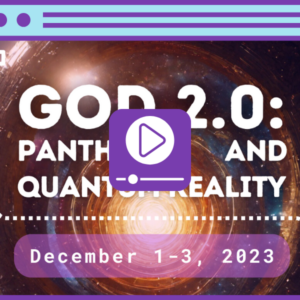Rethinking Religion in an Age of Science: From Institution to Evolution
The Center for Christogenesis 2025 Conference was held virtually Friday, May 2 through Sunday, May 4 (in Eastern US time zone). Purchase of the recordings provide streaming access to all of the speaker presentations (below) and panel discussion.
Ilia Delio | From Monotheism to Undivided Wholeness: Second Axial Religion
Teilhard de Chardin claimed that the principles of Christianity were compatible with the principles of evolution and spoke of Christianity as a religion of evolution. His ideas have been largely rejected, however, by theologians who insist that Greek metaphysics can be reconciled with modern science. Can religious doctrine be changed in an age of science? Ilia Delio will discuss the fears, hopes, and challenges of a new theology in a scientific age.
Grace Ji-Sun Kim | Earthbound: God at the Intersection of Climate and Justice
Climate change is deeply intertwined with theological perspectives on God and is intersectional as various issues come together to continue to affect climate change. Furthermore, if we continue to view God in masculine and patriarchal images and metaphors, then we will continue to live a destructive life toward the Earth. God in patriarchal terms legitimizes our acts of domination towards the Earth. To foster a sustainable relationship with the planet, it is imperative to reimagine God through new metaphors that emphasize care, interconnectedness, and stewardship. Such a theological shift can inspire collective action toward planetary solidarity and ecological justice
This presentation argues that addressing climate change requires not only systemic change but also a transformation in how we conceptualize the divine. By challenging patriarchal theological frameworks and embracing inclusive, life-affirming metaphors, we can reorient our relationship with the Earth and work together to safeguard the planet for future generations.
Robert Nicastro | God Beyond Creeds: A New Theology for a New World
This presentation weaves together the insights of Teilhard de Chardin with the rich witness of scripture to reclaim the central biblical metaphor of love—not as sentiment, but as the source of creativity that binds all things together, inspires the unfolding process of life, and bears the strongest resemblance to the nature of God. In a cosmos where relationship forms the very fabric of existence, love emerges as the generative energy driving the universe toward greater complexity, unity, and consciousness. We will explore how this vision invites a new theology for our moment—one that embraces mystery, affirms evolution, and dares to speak of God not as a distant architect, but as the living pulse of wholeness and transformation at the heart of the world.
Philip Clayton | When Religion Embraces the Evolving Cosmos and the Two Become One
As the title suggests, Philip Clayton has decided to accept Ilia Delio’s bold challenge and run with it. If religio means “re-binding,” what happens when we re-bind religion to the sacred, freeing it from institutions and dogmas so that it can re-join the cosmos in motion? The journey will take us to Teilhard de Chardin and Whitehead, of course, but also to an even wider universe of process resources, to the self-styled “evolutionaries,” to hope and the primacy of the future, and to the place where “contingent moral realism” and “contingent christological realism” meet. In these (somewhat chaotic) places the centre cannot hold, immanent and transcendent fuse, and ― at least in principle ― the walls between the religious and the spiritual begin to collapse.
John F. Haught | Rethinking Resurrection in the Age of Science
Resurrection hope implies that what is most real, essential, and alive can take hold of us only as we turn toward the Future. We can arrive at a sense of cosmic meaning and a feeling for life not by looking toward what lies fixed in the past, or descends from eternity, but by allowing ourselves—and the rest of nature—to be grasped by the coming of the Future. Only by adopting the posture of cosmic hope, in other words, may we begin to encounter the fullness of being, the realness of life and the meaning of Resurrection. In order to do so, however, Christian theology needs to recover from its Platonic captivity and return to the embrace of a more Abrahamic appreciation of time.
Thomas Jay Oord | Ten Ways to Rethink Religion in Light of Science
Both the scientific consensus and the philosophical underpinnings of contemporary science offer resources for religion. In fact, we should rethink some religious beliefs and commitments in light of science. In this lecture, Thomas Jay Oord identifies particular scientific claims or assumptions that can help religion—especially Christianity—adopt a more coherent and experientially satisfying account of God and reality.
 God 2.0: Pantheism and Quantum Reality
1 × $95.00
God 2.0: Pantheism and Quantum Reality
1 × $95.00  Catholicity and Wholeness Beyond the Church
1 × $25.00
Catholicity and Wholeness Beyond the Church
1 × $25.00 